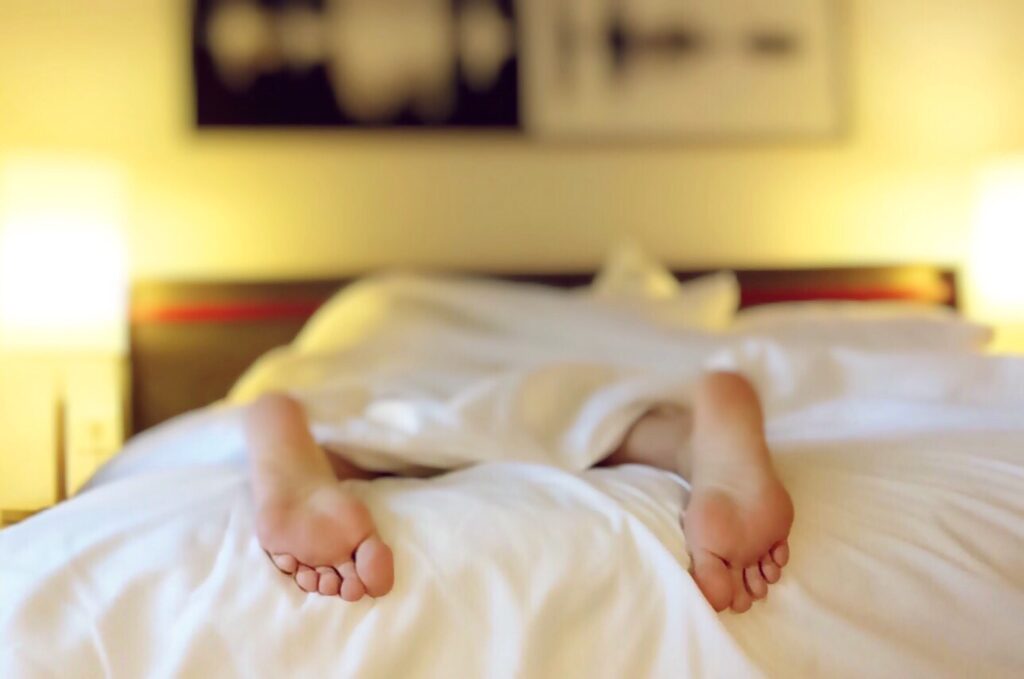When most people think about their New Year’s resolutions, they’re thinking about exercising more, eating better, or maybe even trying to reduce stress. Don’t get us wrong, these are fantastic things to focus on, but one aspect of wellness that’s undervalued and underestimated is sleep.
Have you ever had a restless night? You know the kind where you’re tossing and turning, and finally, by the time dawn breaks, you’re telling your partner, “I don’t think I slept at all last night.”
That next day just feels kind of off, right? You might eat a bit more than normal, take longer than usual to come up with a common word, or get a bit snippier toward the kids or your spouse.
We get it; those days are hard. And that’s because of a simple truth.
Sleep is the foundation of everything.
What Happens When You Don’t Get Good Sleep?
Many people fail to prioritize sleep appropriately, but hear us when we say some pretty nasty side effects can derail your fitness goals as a result. Here are three.
1. Poor sleep messes with your hormones.
When you don’t sleep well, your hormones fall out of balance. The two biggies for someone trying to reach a goal like eating healthier are ghrelin and leptin.
Ghrelin is the hormone that says, “I’m hungry.” And when you don’t sleep well, ghrelin increases and starts to scream all day long. That may be why after a poor night of sleep, you choose to grab that donut in the breakroom when normally you fast until lunch.
Partner ghrelin’s noisiness with the dropoff of its partner hormone, leptin, which tells your body “I’m full,” and you’ve got a nutritious recipe for disaster. Rising ghrelin and falling leptin mean your body is in a state of consistent hunger where it seems like you can’t get full no matter how much you eat.
Another hormone negatively impacted by a poor night’s sleep is cortisol, which is your primary stress hormone. A period of sleep deprivation causes cortisol to increase, leading to higher levels of stress during your day.
Human growth hormone (HGH) is a hormone released during sleep and is responsible for repairing tissues. Lack of sleep can cause HGH levels to be suppressed, which can slow your body’s ability to heal after injury or exercise.
2. Poor sleep can weaken your immune system.
Your immune system is a complex system responsible for helping your body defend against intruders like diseases that can hurt you. But the immune response can be suppressed when you don’t get enough quality sleep. That means you could be more likely to catch a cold after exposure or limit your ability to recover quickly after getting sick.
3. Poor sleep can decrease your body’s ability to recover.
When you’re working out regularly, getting quality sleep is one of the most important things you can do to promote recovery. While you snooze, your body is relaxing, which can release muscle tension and ease muscle soreness. Your body also allows more blood flow to muscles, delivering more nutrients and promoting more healing.
Consistent, great sleep can help you increase your muscle-building potential, coordination, and energy levels. Without it, you may find yourself feeling poorly in the gym or maybe even skipping workouts altogether.
Tips for Quality Sleep
Luckily, there are simple habits you can start if you’re struggling in the sleep department.
- Develop a consistent exercise routine.
- Wind down an hour before bed sans screen.
- Get into a regular nighttime routine (shower, brush teeth, read for 15 mins).
- Stop eating at least 3 hours before you plan to hit the sheets.
- Wake up at the same time each day, regardless of what time you go to bed.
- Get sunlight on your body first thing in the morning when possible.
If you’ve tried it all and your sleep isn’t getting any better, it’s best to work with a medical professional trained to diagnose more significant sleep issues that may be at play.
The Last Word About Sleep and its Importance for Recovery
The big takeaway? Focus on sleep! If you haven’t previously been mindful of it, note approximately how many hours you’re getting each night and if you feel rested in the morning. Aiming for 7-9 hours is a great goal for most adults. Not only will getting better sleep aid in recovery, but it will likely have the unintended side effect of making you a happier person.
Like what you’ve read and want to hear more from Foundation FIT?
Sign up for our email list below to receive our monthly newsletter and snag our self-care checklist for free!

